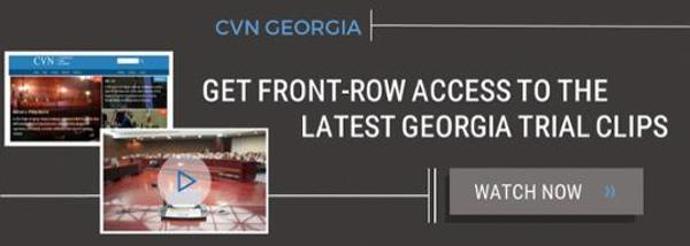
UPDATE - The parties reached a $35,000 settlement in the case that was announced in open court before opening statements. Plaintiff's attorney T. Michael Flinn described the result as the end of an arduous four year legal legal struggle that was a very important case for all consumers. He emphasized that the result would benefit all Georgia consumers and not just his client. Representatives for the defense were unavailable for comment prior to the posting of this update.
Atlanta—A case involving a Carfax report that a used car dealer allegedly knew was incorrect when given to the customer heads back to the Fulton County Superior Court for trial following a major consumer rights decision by the Georgia Supreme Court. Consumer advocacy groups have already hailed the decision as a “big win for Georgia consumers affected by misrepresentations made by used car dealers,” and Courtroom View Network will provide gavel-to-gavel coverage of the trial, beginning September 21. Subodh Raysoni v. Payless Auto Deals, LLC et al. (2012CV214811).
The case arose out of the purchase of a 2008 Honda Odyssey minivan by Subodh Raysoni from Payless Auto Deals on September 18, 2011. According to documents filed in the case, Rasyoni contends that he told the Payless salesman that he wanted to purchase a reliable and durable automobile. After seeing the Honda, he asked the salesman if there was anything wrong with the vehicle, such as a prior wreck or damage. The salesman told Raysoni that there was nothing wrong with the Honda and that it was “clean” and “undamaged.” In addition, at Raysoni’s request, the salesman showed him a Carfax report that showed there was no damage to the minivan and no indication that it had been involved in a wreck.
 Raysoni further contended that, over time, he noticed a musty smell in the minivan, and, approximately two months after he purchased it, he attempted to trade it in at a Carmax dealership. There, he learned that the vehicle had suffered significant frame damage in a wreck, it was worth much less than he had paid for it, and that it would require at least $10,000 in repairs and, even then, would lose at least $8,000 in value. Payless refused to repurchase the van, and Raysoni filed suit under the Fair Business Practices Act, alleging fraud.
Raysoni further contended that, over time, he noticed a musty smell in the minivan, and, approximately two months after he purchased it, he attempted to trade it in at a Carmax dealership. There, he learned that the vehicle had suffered significant frame damage in a wreck, it was worth much less than he had paid for it, and that it would require at least $10,000 in repairs and, even then, would lose at least $8,000 in value. Payless refused to repurchase the van, and Raysoni filed suit under the Fair Business Practices Act, alleging fraud.
According to the lawsuit, Payless had purchased the vehicle at auction, and the auction invoice included a lengthy list of pre-existing damage to the vehicle, much of which would be evident to someone in the used car business. Further, Raysoni alleged that Payless knew that Carfax reports were often out-of-date and took advantage of that fact by showing him a “clean” report it knew to be inaccurate.
However, the trial court dismissed Raysoni’s case, and the Court of Appeals affirmed. Both lower courts relied on a fairly standard general warranty disclaimer in the written sales contract that the car was sold “AS IS NO WARRANTY.” In addition, the lower courts relied on various statements in the written sales contract Raysoni signed, such as: “NO SALESMAN VERBAL REPRESENTATION IS BINDING ON THE COMPANY,” “CUSTOMER SHOULD NOTE THAT THIS VEHICLE WAS ANNOUNCED HAVING UNIBODY DAMAGE AT THE AUCTION,” and “WE STRONGLY RECOMMEND CUSTOMERS SHOULD GET VEHICLE INSPECTED BY A MECHANIC OF THEIR CHOICE BEFORE MAKING THE PURCHASE.” These other statements appeared in capital letters as part of the “fine print,” in what Raysoni estimated was a 5.6 point font size.
The Georgia Supreme Court reversed and remanded the case for trial, Raysoni v. Payless Auto Deals, LLC et al., 296 Ga. 156 (2014). As the Supreme Court recognized, in order to make out a case for consumer fraud under the Fair Business Practices Act, Raysoni was required to prove that he relied on the defendant’s misrepresentations, and that his reliance was reasonable. The lower courts believed that the contractual language rendered Raysoni’s reliance unreasonable as a matter of law. However, the Supreme Court said that the disclaimer language in Raysoni’s contract and the nature of the representations Payless made, including the Carfax report, made the question of Raysoni’s reliance a fact question for the jury.
The Supreme Court acknowledged that if a contract contains a binding and comprehensive merger clause, then, generally, reliance on precontractual representations is unreasonable as a matter of law. In the Supreme Court’s view, though, the statement “No salesman verbal representation is binding on the company” did not serve as a comprehensive merger clause because it only excluded “verbal” representations. In Raysoni’s case, the salesman had also supplied him with a written Carfax report.
The Supreme Court also rejected the contention that the “as is” clause was a comprehensive warranty disclaimer because it was “followed immediately by an explanation that arguably qualifies and limits that disclaimer: ‘The dealership assumes no responsibility for any repairs regardless of any oral statements about the vehicle.’” In addition, the contract actually did include a warranty on the CV joints for 30 days. The Court concluded: “We cannot say as a matter of law that the contractual disclaimers of warranties — which are, at least arguably, equivocal and limited — preclude any reasonable reliance in this case on a written Carfax report furnished by Payless.”
As for the other capitalized language in the “fine print,” the Supreme Court noted, “No one should make the mistake of thinking, however, that capitalization always and necessarily renders the capitalized language conspicuous and prominent. In this case, the entirety of the fine print appears in capital letters, all in a relatively small font, rendering it difficult for the author of this opinion, among others, to read it. Moreover, the capitalized disclaimers are mixed with a hodgepodge of other seemingly unrelated, boilerplate contractual provisions — provisions about, for instance, a daily storage fee and a restocking charge for returned vehicles — all of which are capitalized and in the same small font.”
For these reasons, the Supreme Court held that the “fine print” disclaimers were not unequivocal enough, as a matter of law, to defeat Raysoni’s claim on the pleadings alone. “[O]ur analysis is driven in large part by the precise words used in this contract, as well as the arguable qualifications and contradictions that appear on the face of the contract. Perhaps different contractual provisions — for instance, a comprehensive merger clause or a clear and direct disclaimer that ‘THIS VEHICLE IS DAMAGED’ or ‘THIS VEHICLE HAS BEEN WRECKED’ — would lead to a different result. But we do not decide such things, for that is not the case before us. On these pleadings, we cannot say as a matter of law that Raysoni will be unable to show that his reliance on representations that the minivan was undamaged and never had been in a wreck — particularly the written Carfax report — was reasonable.”
Courtroom View Network will continue to report on the trial as it develops. Steve Silver can be reached at ssilver@cvn.com
Watch on-demand video of the trial as soon as it becomes available.
Not a Subscriber? Learn more about CVN's unparalleled coverage of top Georgia trials.




